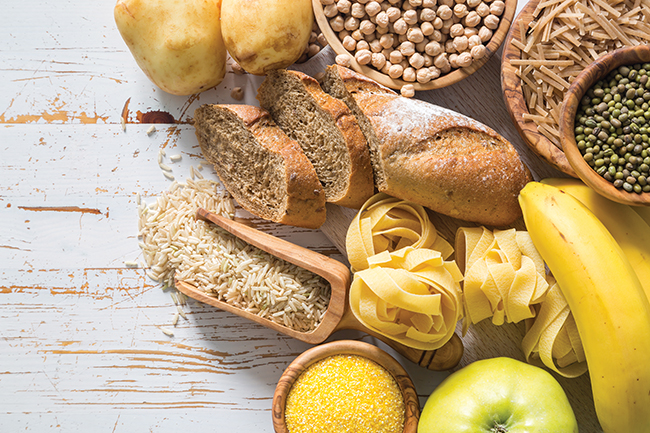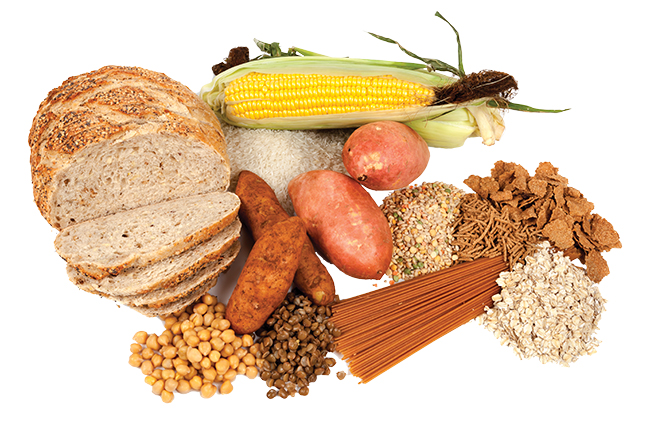Michelle Kickham dispels the myth that carbs are the enemy of the dieter, instead giving us plenty of reasons why they should be highlighted as rich and essential sources of our life force…

Carbohydrates have been getting a pretty bad rap lately. The media leads us to believe that they are in some way ‘fattening’ foods to eat and that any weight-loss efforts are doomed unless you choose to cut the carbs. This is unfortunate as all evidence points to the contrary, as they are in fact nutritious foods to eat – as long as you choose the right ones.
There are three predominant types of carbohydrates; sugars, fibres and starches. Sugars are ‘simple’ carbohydrates found in foods such as fruits and vegetables, while fibres and starches are known as complex carbohydrates. The simple, sugary carbohydrates are easy for your body to break down into glucose – the main source of energy for your cells. They provide a quick and short-lived burst of energy (spike in blood sugar) and these are the ones you want to limit, to a certain degree.
Complex carbohydrates are just as they sound – they’re complicated molecules and so they take longer to break down, meaning they provide a longer lasting source of energy, without that dramatic increase in blood sugar. These are the ‘good’ carbs (there are no ‘bad’ carbs, but for simplicity we’ll call them that) and they can be found in whole grains, root vegetables, beans and some fruits.
WHY ARE WE SO AGAINST THEM?
One of the main reasons why carbs are deemed the dieters’ enemy is because they are very easy to overeat – especially the simple, sugary ones. Processed foods, sweets and fast foods contain high amounts of sugar and we all know how easy they are to chomp down on. Think about it, it’s a lot easier to sit down and eat a huge bowl of pasta than to eat a big bowl of steak!
Too many of these addictive, sugar-filled foods can have a negative impact on the body’s insulin sensitivity which can lead to diabetes, weight gain and heart problems.
It’s not actually the carbohydrates that are causing the problem, it’s the serving size and the type of carbohydrates consumed that are the issue. Instead of changing how much and which type of carbohydrate to eat, some people just drop them completely.
If you’re cutting your carbohydrates and sick of eating cauliflower rice for dinner, then this article is for you, because we’re clearing up the controversy on carbohydrates once
and for all.
WHY YOU NEED THEM
1. Energy!
Carbohydrates are a direct source of your body’s best friend – glucose, the predominant source of energy for your body. If you’re body runs low on carbohydrates, it has to turn to protein (from food or skeletal muscle) and fats as a source of energy. Your body can’t use protein or fat as a direct source of energy and so it must process them before they can be used. This process (called gluconeogenesis) is extremely energy inefficient and also puts you at risk of muscle atrophy (muscle wasting) and hypoglycaemia.
Although glucose (blood sugar) is heavily involved in physical activity, it’s also required for the day-to-day ‘housekeeping’ jobs such as cell repair, hormone regulation and multiple metabolic functions. So next time you’re thinking of cutting the carbs for your lazy days, remember they’re a lot more than just muscle-food!

2. Fibre
Fibre provides bulk to the foods we eat as it moves from our stomachs to the colon, aiding in digestion and efficient absorption of nutrients. Dietary fibre speeds up the rate at which food moves through the digestive system, preventing food from going rancid in our digestive tract, something that can cause bloating, heartburn and indigestion.
Fibre does more than aid in regularity though! A high level of fibre in the diet correlates to a decreased tendency of premature death due to its positive effects on cholesterol levels, as well as helping those friendly bacteria in your tummy thrive!
While most people associate fibre with the less ‘attractive’ foods (did someone say bran flakes?) it’s actually very easy to sneak into your diet. Oats, potatoes, beans and fruits are all terrific sources of fibre and don’t taste like a bowl of wood chippings either!
3. Strength!
Your muscles require carbohydrates to function – it’s their fuel! If you restrict your carbohydrate intake, your performance in the gym, sports and any physical activity will suffer. In addition, cutting your carbs while engaged in any sort of weight training can have devastating effects on your muscle tissue and limit your ability to increase strength and overall fitness.
4. Sleep!
Carbohydrates contain high levels of tryptophan, an essential amino acid known for its stress-relieving properties. Tryptophan is involved in the production of serotonin (the ‘happy’ hormone) and aids in mood regulation and your circadian rhythm (our biological clock). So next time you’re struggling to get that shut eye, remember that a bowl of oatmeal or a banana before bed is ten times more beneficial than any sleeping tablet.
5. Brain!
Your brain requires carbohydrates to function properly – something we can all agree is pretty important. Appearing idle from the outside, your brain actually consumes up to 400 calories a day just by concentrating on your day-to-day activities. If you starve your brain of its fuel by reducing carbohydrates, you’re at risk of suffering from cognitive decline and memory problems.

Take home message
Carbohydrates are not the devil! You won’t develop diabetes over that chocolate bar you had last week, or the warming bowl of oatmeal you enjoy on the cold winter mornings. If you provide your body with the right amount of the best quality carbohydrates you will reap the benefits those grains provide!
About the author:
 Michelle Kickham is a doctoral candidate in Immunology and Organic Chemistry and a current Irish Research Council scholar. Michelle believes that science holds the power to make a real difference and her goal is to explain the science behind health claims, offer advice and tips, as well as sharing healthy recipes to suit almost any diet.
Michelle Kickham is a doctoral candidate in Immunology and Organic Chemistry and a current Irish Research Council scholar. Michelle believes that science holds the power to make a real difference and her goal is to explain the science behind health claims, offer advice and tips, as well as sharing healthy recipes to suit almost any diet.
For more information, visit www.lifeliftsandlabcoats.wordpress.com
